UNBREAKABLE / NEZLAMNI
“You try not to let it get to you, but to help instead”: Anastasia Didenko about helping the victims of sexual violence

Anastasia Didenko, a volunteer and a Senior Associate of the Criminal Law Practice at the LFC Law Group, started working at the Ukrainian Women Lawyers Association “JurFem” when the war broke out. She is currently involved in consulting people who suffered from sexual violence committed by the Russian military.
In the “Unbreakable” special project, Didenko spoke about what Ukrainians who became victims of sexual violence by the Russian military should do in this situation, why wartime violence is so widespread and how one should approach working with the victims.
Beginning of the war: volunteering and working at “JurFem”
I am a senior associate of the criminal law practice dealing with white collar crimes (those are the crimes, where the “culprit” is a representative of government, business, an official, a public figure, etc.). Before the war, I had never had to deal with such category of crimes as offenses against sexual freedom and inviolability.
Since the start of the war, I’ve been in Kyiv and oblast. I’ve been involved in volunteering and legal assistance work. I’ve raised funds and organized acquisition of protective gear for the military, delivery of children’s food from abroad, and also processed appeals of people who wrote to me on social media about their homes being destroyed, going abroad, recovering documents, etc. There is a hotline at the Ukrainian Bar Association, where people can call with the same issues and where I also processed requests. Usually, I took the questions related to tax, migration, family, and criminal issues.
I hardly slept during the first month of the war: I would go to bed in the morning and sleep until noon, as it seemed to me that that was the safest time to sleep. When numerous reports of sexual violence committed by the Russian military appeared online, I saw they were looking for people to join the “JurFem: Support” initiative aimed to help those affected by the war, and primarily people who suffered from various forms of sexual violence. I submitted an application, passed the selection and started my training. My training mostly consisted of study sessions with a psychologist, because this is a rather specific category of cases. In peaceful life, you try not to let the emotions of each client and their case to get to you, while this ability becomes even more important in this category of cases. The psychologist I trained with gave me practical advice on how to communicate with victims, and what the algorithm of such communication should be. For example, when talking to a victim, you cannot empathize with her/him or give your assessment to their experiences. Communication should be emotionally reserved, because the goal of a lawyer is not to live through it and psychologically support the person, but to help this person from a legal point of view.
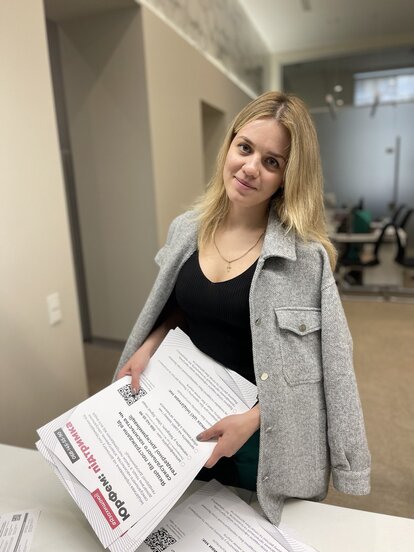
I also held lectures, posted information in the “Share with us. “JurFem: Support” community on Viber, held consultations with the victims, who hadn’t filed lawsuits, as they were not morally ready for that. We do not discuss the number of filed lawsuits or reported crimes among colleagues, as everything happens confidentially. Right now, “JurFem” is holding the Women’s Rights Defenders Academy, the first one in Ukraine. The purpose of the academy is to unite all female solicitors & lawyers from all over Ukraine, who subsequently will be able to provide high-quality gender-sensitive legal aid to victims of gender-based violence as well as sexual violence, including conflict-related sexual violence.
I have extensive experience of working the criminal cases in family litigations, so I understand well that I won’t be able to help a person by sympathizing. You need to be emotionally stable in order to provide quality support, because if I try and ‘live through’ all the situations, I won’t be able to provide legal support, while my main task as a lawyer is to provide quality legal support and protection of a victim using available legal methods.
Sexual violence as a method of pressure and intimidation during the war
Sexual violence has become a more frequent phenomenon when the war started, and there are certain reasons for that. First, the military uses sexual violence as a strategy for achieving military goals. Sexual violence can become massive in nature and be committed against many people, and then, full-scale attack on the civilian population or commission of acts of genocide becomes a strategic goal.
Second, sexual violence can be used to weaken the community and gain control over it. It is used to punish or destroy a certain group of people to force them to leave the territory.
Another reason is an attempt to influence certain people because of their positions, status or role in the community. For example, acts of sexual violence are committed against the heads of villages or members of their family in order to obtain information about the ATO veterans living in this specific populated area, people with military experience, etc.
Battalion commanders also use the method of sexual violence to unite the soldiers: it could be used as a reward for a successfully completed mission. Quite often, sexual violence is used as a method of torture. For example, it is rather widespread among soldiers who use it in prisons against captives, and also on occupied territories against men of draft age.
Sexual violence can also be used as a part of ritual practices. For example, soldiers may believe that when they have sexual intercourse with virgins or children together, it heals them and makes them invincible.
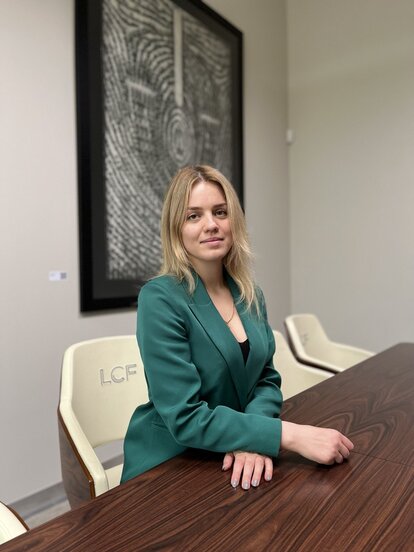
Russian soldiers often commit the acts of sexual violence publicly: for example, raping children in front of their mothers or letting the victim go so that she could tell others what happened to her. This is how the military spread terror and panic among the people.
I cannot tell you the exact number of people who suffered as a result of this kind of violence, because many victims do not come to law enforcement agencies to report these crimes. Compared to women, men report that they have been victims of sexual violence rather rarely. After all, there are certain myths in the society about sexual violence and men, for example, there is a belief that they can defend themselves, they are strong and suffer less psychologically, etc. Therefore, only a small percentage of men file reports of crimes to the police, which does not mean that their number is smaller than the number of affected women.
The following main features of sexual violence during a war can be distinguished:
- It is mass in nature, i.e. many people suffer from it;
- It is public in nature, when violence is committed in front of family or other people to exert psychological pressure or to psychologically break a person;
- The violence is committed with particular brutality, because the victims often suffer from genital injuries or die as a result of the violence committed against them.
Sexual violence in international law
In the case of Akayesu, the International Criminal Tribunal for Rwanda, determined that “sexual violence is considered to be any act of sexual nature which is committed on a person under circumstances which are coercive”.
The term “act of sexual nature” is rather broad, and its components may be different, specifically from sexually-underlined comments about another person to commission of physical acts.
The term “coercive” must be understood in a broad sense, including not only manifestations of physical force, but also threats, intimidation, extortion and other forms of coercion.
Therefore, the Trial Chamber further determined that “sexual violence is not limited to physical penetration of a human body and can also include actions that are not related to penetration or even physical contact”.
This means that sexual violence is not only rape, but also other actions that are sexual in nature.
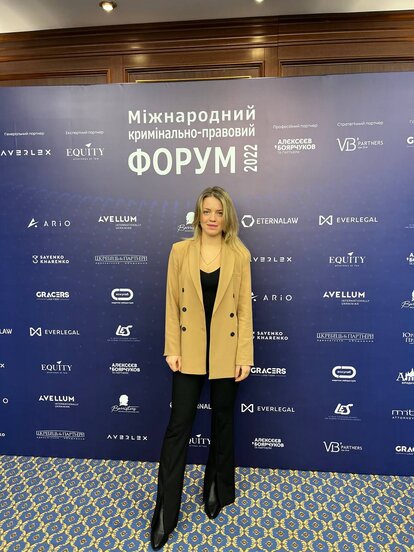
Sexual violence in the international law consists of such actions as rape, threats to attempt any form of rape, sexual slavery, pregnancy, exposure, enforced prostitution, genital mutilation, sexual torture, including electric shocking of the genitals or squeezing of the nipples, or enforced viewing of sexual abuse of a partner or child and other forms.
In terms of giving a definition to the notion of rape, the Akayesu case was the first decision, in which rape was defined in the international law. The judges defined rape as a form of aggression, specifying that the central elements of the crime of rape cannot be captured in a mechanical description of objects and body parts.
The notion of rape as a “physical invasion of a sexual nature, committed on a person under circumstances which are coercive” was formed in that case.
The judges highlighted coercion, and not bodily manifestations, and even stated that “sexual violence is not limited to physical invasion of the human body and may include acts which do not involve penetration or even physical contact”.
In the case of Furundžija, the Tribunal found that rape comprised of the following elements: “the sexual penetration, however slight, either of the vagina or anus of the victim by the penis of the perpetrator, or any other object used by the perpetrator, or of the mouth of the victim by the penis of the perpetrator, where such penetration is effected by coercion or force or threat of force against the victim or a third person”.
The judges in the case of Kunarac made it clear that they understood “sexual autonomy” of the victim as a “true” purpose of the laws against rape. Therefore, they primarily focused on the sexual act that involved sexual penetration to which the victim did not give consent or was placed in a position of ‘inability to resist’.
The provisions of the international humanitarian law enshrine a clear prohibition of rape and other forms of sexual violence at any time, including during conflict.
Under Article 8 of the Rome Statute of the International Criminal Court, “rape, sexual slavery, enforced prostitution, forced pregnancy, enforced sterilization and any other form of sexual violation constituting a grave breach of the Geneva Conventions”, “or a grave breach of the joint Article 3” amount to war crimes.
Furthermore, based on the case law of the international criminal tribunals, rape is equivalent to torture. Specifically, the International Tribunal in the Akayesu case equates rape with torture and defines it as one of the forms of torture.
Difference between sexual violence and rape in the national law
Article 152 of the Criminal Code of Ukraine defines rape as an act of sexual nature involving vaginal, anal or oral penetration of the other person’s body using the genitals or any other objects, committed without voluntary consent of the victim.
Key elements of rape:
- Commission of acts of sexual nature.
- Penetration of the body of another person.
- Penetration using genitals or any other object.
- Absence of consent of the victim.
In turn, Article 153 of the Criminal Code of Ukraine defines sexual violence as any violent act of sexual nature not involving the penetration of another person’s body without the voluntary consent of the victim.
Key elements of sexual violence:
- Violent acts of sexual nature.
- Acts not related to penetration of another person’s body;
- Absence of voluntary consent to such acts.
What are the differences between rape and sexual violence?
— Forced penetration
Sexual violence is defined as violent acts of sexual nature which are not related to penetration of the body of another person, unlike rape. For example, if a person was forced to undress completely, it is sexual violence. If this act was followed by a sexual intercourse, it is rape, because it involved penetration of the body of a person.
— Physical violence
With sexual violence, force or physical violence are not mandatory. For example, persuasion can be used or a person might not know what is happening (for example children). In turn, rape is quite often combined with physical violence.
— Awareness of the victim about what is happening
The victim of a rape is almost always aware of what is happening and understands that he/she is being abused. In turn, in case of sexual violence, the victim is not always aware that illegal actions are being committed against him/her.

What is voluntary consent and coerced consent in the context of rape and sexual violence?
The Ukrainian law also defines voluntary consent as a result of expression of a person’s free will, taking into account the accompanying circumstances. This means, there must not be any threats, violence, psychological pressure, etc. A person must be of the age of consent, which means that if a person is 12-14 years of age and he/she consents to a sexual activity, it does not mean that this was voluntary consent, as the person has not reached the age of consent by the law. Also, the person must be capable and be aware of the consequences of his/her actions.
The Criminal Code of Ukraine does not define the ‘accompanying circumstances’, which is why they are determined individually in each case. For example, a person has voluntarily consented to have sex, but this person is unable to make an informed decision due to his/her physical or psychological condition. In this case, taking into account the accompanying circumstances, the consent will not be deemed as voluntary.
There is a popular video called Tea Consent, where tea is used to provide a very clear explanation of what consent is. For example, if a person has agreed to have a cup of tea with you on Sunday, it does not mean that he/she must drink tea with you on Friday or Saturday. Or, if a person doesn’t want the tea, although you’ve already made it for him/her, then don’t make them drink the tea.
The Criminal Code of Ukraine also does not contain the notion of “coerced consent”, when a person is afraid to refuse a sexual contact, while being aware of the circumstances. In the context of an armed conflict, I believe there is always ‘coerced consent’, as the armed conflict itself is a circumstance that prevents a person from giving voluntary consent, even if it was verbally expressed.
Ukrainian law also contains the notion of “compulsion to engage in sexual intercourse”. It is provided in Article 154 of the Criminal Code of Ukraine. However, the case law in Ukraine indicates that this provision of the law (coercing a person into a sexual activity without his/her consent) is used only in cases, when the victim was financially or professionally dependent on the assailant. The specified article is rather rarely used in the context of sexual violence during wartime.
What forms of sexual violence do the Russian soldiers use mostly against men?
The soldiers most frequently commit rape, genital mutilation and enforced sterilization. These methods are particularly used in filtration camps and against people held captive.
What should you do, if you’ve suffered from sexual violence committed by the Russian soldiers?
First of all, the person needs to take care of his/her safety. Next, seek medical assistance, taking into account personal needs and possibilities of the situation. Before medical examination, do not take a shower or a bath, do not brush your teeth, etc. Next, the person needs to take care of his/her mental health. If it is possible, find an expert online/offline. Right now, there are many psychologists providing assistance to victim of sexual violence, including for free.
Preserve the clothes the victim wore, as it may contain evidence of the crime, and collect traces of biological materials (skin of the attacker under the fingernails of the victim, etc.). Record the available information on the assailant(s) who committed the crime, as this information tends to be forgotten after some time. All information is important, therefore write down the names, last names, things that were spoken about, how they addressed each other, etc.
It is also necessary to submit a statement to the law enforcement agencies reporting a criminal offense. The statement can be filed with any police precinct or public prosecutor’s office. There is no need to do it at a specific location of a law enforcement agency. A person can file a statement with the police or other law enforcement agencies using chatbots, email, or by contacting NGOs, for example “JurFem”. In addition to legal assistance, these organizations also provide psychological support. Most organizations first offer psychological support, and, if a person is indeed ready to file a statement, the lawyers join to work on it and help submit a statement reporting a criminal offense with the law enforcement agencies.
So, here is what needs to be done:
- Document the fact of commission of sexual violence against a person.
- Document injuries (photos, drawings, videos, etc.).
- Collect samples of biological materials (if possible).
- Inform law enforcement agencies.
There are certain specifics to this procedure, if the victim is in the occupied territory or a territory, where active fighting is taking place. In that case, a person can try and preserve the evidence of sexual violence independently and to the best of his/her abilities.
If you’ve become a victim of sexual violence, first of all, you need take photos of the evidence of violence on your body: torn out hair, bruises on hands and neck, etc. You can also record a video. If you are morally ready to do it, you also need to record traces of violence on the genitals. This is a question about your mental condition of a person, because you will have to record what you are ready to show and do. If it is not possible to take photos or make videos of these traces, you need to describe them on a paper and have two other people (if possible) confirm that you indeed have the specified injuries. Also, if it is possible, biological samples need to be collected. They are usually found on genitals and under nails. You need to take a sharp object and remove traces of skin, place it in a paper or plastic bag, and let the air out of the bag, so that the material does not get spoiled. The package is sealed, and if possible a paper strip is glued to it. It is desirable to do it also in the presence of two witnesses, who write on a separate piece of paper what the bag contains, for example “a biological sample taken from under the fingernail of person A”. As for collecting evidence on the genitals, you need to moisten gauze, insert it into the genital organ, pull it out and seal it in a paper bag. It is also desirable to leave the information about the people who signed the paper, because it will be difficult to find them only by their first and last name. Due to the situation in the country, people move, change their numbers, etc. Therefore, it is important to provide some information about them to make it possible to contact them later on.
You can submit information to the International Criminal Court as follows:
-Office of the Prosecutor of the International Criminal Court in the Hague, email: [/cdn-cgi/l/email-protection [email protected]] (you can write in any language);
-Prosecutor General’s Office in Ukraine: warcrimes.gov.ua. — website for centralized collection of information about war crimes, where you can upload photos and videos to be used in the future to restore justice in Ukraine and international bodies;
-Telegram bots: Security Service of Ukraine (SBU): @stop_russian_war_bot; Cyber Police of Ukraine: @ukraine_avanger_bot.
Remember, only the offender is guilty of what happened. The guilty ones must be brought to justice. File reports and ask NGOs, law enforcement agencies, etc. for assistance.
Why is it important to file statements and reports with the law enforcement agencies?
It is important to file statements and reports to the law enforcement agencies, because the more reports the higher the probability of identifying the person who committed these crimes and bringing them to justice. Often, one and the same person commits repeat offenses against sexual freedom and inviolability. One victim may learn the first name of this soldier, and another – last name, and this will help the law enforcement agencies identify the offender and bring him to justice.
Global experience of establishing justice in similar cases
Conflict-related sexual violence has no statute of limitations. Therefore, the victims can file a statement with the law enforcement agencies even after some time passes. The war tribunals, at which rapists were convicted, took place many years after the fact.
For example, the International Criminal Tribunal for the former Yugoslavia convicted 32 persons for sexual violence by the end of 2016, while the military conflicts ended in the end of the 1990s. The cases covered instances of sexual violence against women and men.
We have a convention that states that there is no statute of limitations on war crimes, which means that is a person is not ready to go to the police to report a rape, he/she can do it later. For example, there is a statute of limitations for the crimes against sexual freedom and inviolability that are not related to the war, while for war-related crimes of this kind, there is no statute of limitations.
For example, if a person reports a crime three years after she/he was raped, they will naturally won’t be able to collect and provide evidence of the crime. The evidence will not be mandatory; the person must simply report the circumstances of how it happened and the law enforcement agencies will investigate the case. Of course, it is better to have documentary confirmation, and biological samples, because it will help find the offenders faster.
What is the qualification of sexual violence during a war under the law of Ukraine and what kind of responsibility does the law provide?
We have Article 152 of the Criminal Code of Ukraine (rape) and Article 153 of the Criminal Code of Ukraine (sexual violence), but right now the law enforcement agencies register criminal cases under Article 438 of the Criminal Code of Ukraine (Violation of the Laws and Customs of War). Quite frequently, the law enforcement officers register criminal proceedings both under Article 438 and Articles 152 and 153 of the Criminal Code of Ukraine. This does not interfere with the investigation in any way. The offender may face 10-15 years in prison, and if a person committed these crimes repeatedly, he/she may face 15 years to life in prison.
“Life is getting back to normal”: on restoring physical and psychological resources and plans
Right now, I am quite successful in combining work, participating in projects and taking time to restore my inner resources. I went back to the gym starting from the second month of the war, and it helped me, and is helping me release aggression and regain my calm emotional state. Also, the rare, but so heartfelt meetings with friends and family help me restore my inner energy. For example, just last weekend, I became a godmother to my friend’s daughter. The girl was born on February 22 in Kharkiv and was at the maternity hospital with her mother when the war started. They had to flee to Western Ukraine, and we had an opportunity to baptize her only recently. In those moments, you feel emotionally lighter, although the talks until the morning are, unfortunately, mostly about the war now…
Cooking is another way for me to return to my usual emotional state. When I cook, I distract myself from reality and enjoy the process of cooking, and then decorating and serving, and, of course, tasting together.
During the war, there was a moment, when it seemed to me that my values changed completely, but now life is slowly turning back to normal and the values are returning as well. However, the priorities of these values have changed a lot. Probably the biggest value that appeared during the war is to care more about family and friends, with the material things moving into the background.
As for the plans, I don’t really like to discuss global plans until they come true, but I do have many plans in all spheres of life, although now you cannot be sure that you will realize them, unfortunately. Before, everything usually depended on you, while now everything depends on accompanying circumstances that can change every day and every hour. Therefore, I will share with you only general plans: grow professionally, work, volunteer and continue to be as involved in the projects that have already been launched as possible.
his article was prepared by the editorial office of Ukrainian women´s magazine WoMo as a part of the "Unbreakable" author´s special project in cooperation with Friedrich-Naumann-Foundation for Freedom in Ukraine supported by the Federal Foreign Office.

Militärjournalistin Iryna Sampan: „Während vier Monaten adrenalingeladener Freiwilligenarbeit wurde mir klar, dass mir nur der Journalismus helfen kann, wieder zu Kräften zu kommen.“
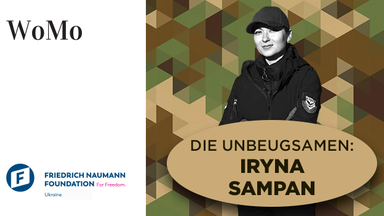
Iryna Sampan ist eine Militärjournalistin, die bei Kriegsbeginn beschloss, sich freiwillig zu melden und Autos für das Militär zu transportieren, weil sie glaubte, dass dies für die Ukraine im Moment notwendiger ist. Nach vier Monaten kehrte sie jedoch zum Journalismus zurück und bringt jetzt Geschichten über das Militär von der Frontlinie. Im Sonderprojekt „Die Unbeugsamen“ erzählt Iryna warum sie sich für den Journalismus entschied.
First Lieutenant Yulia Mykytenko: “Men no longer refuse to serve under my command because I am a woman”
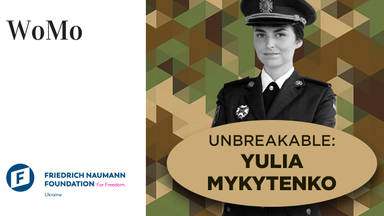
Yulia Mykytenko joined the Armed Forces of Ukraine on a contract in 2016 together with her husband. After doing the “work for women” at the headquarters, she entered The Hetman Petro Sahaidachny National Army Academy, returning to the front as a combat officer. After the death of her husband in February 2018, Yulia went to work at the Kyiv Military Lyceum. In the special project "The Unbreakable", Mykytenko talks about how the Ukrainian army changed and how important it is to be in your own place.
“War is another case I need to win,” Inga Kordynovska on the humanitarian centre in Odesa
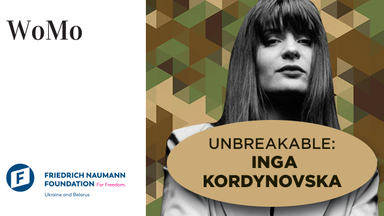
Inga Kordynovska is the owner of a law firm, who despite the threat of occupation of Odesa at the beginning of the war stayed in the city and established the Humanitarian Volunteer Centre in Odesa and then two more projects to help internally displaced people, mothers in particular. In the “Unbreakable” project, Inga shares how legal practice helped her during the war and why humanitarian aid is not her main goal in helping those affected by the war.